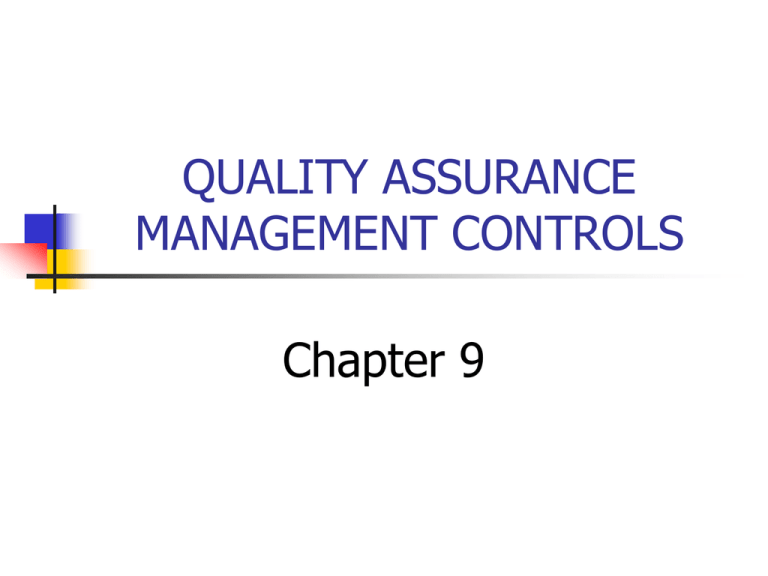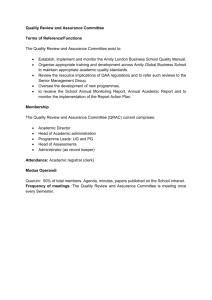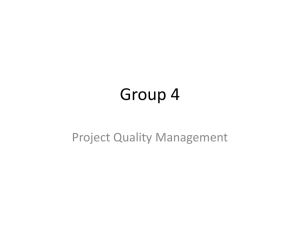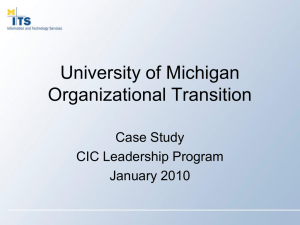QUALITY ASSURANCE MANAGEMENT CONTROLS Chapter 9
advertisement

QUALITY ASSURANCE MANAGEMENT CONTROLS Chapter 9 Quality Assurance (QA) Management is concerned with ensuring: 1) 2) The information system produced by the information system function achieve certain quality goals. Development, implementation, operation, and maintenance of information systems comply with a set of quality standards. Motivation Toward The QA Role 1) 2) There are six reasons why the information systems QA Role has emerged in many organization: Increasingly organizations are producing safety critical information systems Users are becoming more demanding in terms of their expectations about the Motivation Toward The QA Role 3) 4) quality of software they employ to undertake their work Organizations are undertaking more ambitious projects when they build software Organizations are becoming increasingly concerned about their liabilities if they produce and sell defective software Motivation Toward The QA Role 5) Poor quality control over the production, implementation, operation, and maintenance of software can be costly in terms of missed deadlines, dissatisfied users and customers, lower morale among information system staff, higher maintenance, and strategic projects that must be abandoned Motivation Toward The QA Role 6) Improving the quality of information systems is part of a worldwide trend among organizations to improve the quality of the goods and services they sell QA Functions QA personnel should work closely with information systems personnel to improve the quality of information systems produced, implemented, operated and maintained in a organizations. QA Functions 1) 2) They perform a monitoring role for management to ensure that: Quality goals are established and understood clearly by all stakeholders Compliance occurs with the standards that are in place to attain quality information systems QA Functions In the following subsections we examine six specific functions that QA personnel should perform. Auditors should know about these functions to be able to evaluate whether they are being performed reliably by QA personnel more over, if QA personnel are not performing these function reliably, auditors must understand the implications for the conduct of the audit 1) Developing Quality Goals One of the more difficult tasks that QA personnel must undertake is to develop quality goals for the information systems function and to develop or approve quality goals for specific information systems Figure 9-1 Software Quality Characteristics Quality Characteristic • Functionality • Reliability • Usability Efficiency • Maintainability • Portability • Explanation • Extent to which the software contains the functions needed to satisfy user needs • Extend to which the software sustains its level of performance under stated conditions for some defined time period • Level of effort needed for users to exploit the functionality of the software • Level of resources consumed by th software to performs its functions • Level of effort needed to modify the software • Extent to which software can be transferred from one hardware/software platform to another Figure 9-2 Using a Project Plan To Attain Quality Goals 2) Developing, Promulgating and Maintaining for the Information System Function a) There are four advantages to having QA personnel assume responsibility for the development, promulgation, and maintenance of information systems standards: QA personnel are charged with being knowledgeable about and remaining up to date with best practice in information system standard 2) Developing, Promulgating and Maintaining for the Information System Function b) c) d) Decisions on standards can be a political issue that evokes strong, emotive reactions QA personnel must undertake analyses of the reasons when an organization fails to achieve its information system quality goals QA personnel must ensure that the organization adopts an d complies with the best set of information systems standards possible 3) Monitoring Compliance with QA Standards a) b) QA personnel undertake two types of monitoring of compliance with QA standards: They monitor compliance with the QA plan prepared for a specific systems QA personnel should seek to avoid disputes over detail 4) Identifying Areas for Improvement a) For two reasons, QA personnel should have responsibility for identifying areas where information systems function can be improved : Given their overarching concern with quality assurance, they are in the best position to offer independent advice 4) Identifying Areas for Improvement b) QA personnel should have the knowledge and experience to make the best recommendations for improvements to information system standards or processes 5) Reporting to Management Regular reports on compliance with general/specific standards 6) Training in QA Standards and Procedures a) QA personnel have responsibility for training all stakeholders in the information systems function in QA standards and procedure. They must undertake two types of training: Focuses on providing general knowledge about quality assurance 6) Training in QA Standards and Procedures b) Focuses on standards and procedures that will be specific to an application system Organizational Considerations Placement of the QA function The QA function must be placed within the organizational hierarchy of the information systems function so that it can act independently of other information systems activities. Figure 9-8 Placement of the QA function within the organizational hierarchy of the information systems function. Vice President Information Systems Manager IS and IT Planning Manager Information Technology Services Manager Quality Assurance Manager End-User Support Manager Corporate Systems Integration Manager Contracts and Outsourcing Applications Development Applications Maintenance Standards Development Data Administration Database Administration Corporate Modeling Manager Operations Facilities Manager Administration Organizational Considerations Auditors can interview QA staff, information systems staff, and information system users to determine the scope and depth of QA work and to assess whether funding of the QA function Organizational Considerations Staffing the QA function QA personnel must be well trained and competent, and their skills must be kept up to date. Auditors should evaluate whether QA personnel have adequate knowledge of information systems development, implementation and operations procedures. Relationship between Quality Assurance and Auditing Objectives and Functions of QA personnel and auditors are the same. Both QA personnel and auditors are concerned with the existence of information system standards, compliance with these standards, and timely, corrective actions when deviations from standard occur.




